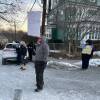Boston saw a jump in COVID-19 vaccinations the week before the city's new proof of vaccination mandate went into effect, with 81% of residents now having received at least one dose, Mayor Michelle Wu told Boston Public Radio on Tuesday.
Boston's vaccine mandate went into place on Saturday, requiring people ages 12 and older show proof of at least one dose of a COVID-19 vaccine to enter restaurants, gyms and other indoor, public spaces in the city.
"It's been very, very smooth," Wu said in reference to the first few days of the requirement being implemented.
The citywide policy takes a phased approach. By Feb. 15, people ages 12 and older will need to show proof of full vaccination, defined as receiveing two doses of the Moderna or Pfizer vaccine or one dose of the Johnson & Johnson vaccine. Children ages 5 and older will have to show proof of one dose starting March 1, and full vaccination starting May 1.
Wu said there is no immediate plan to update the policy to include booster shots as a requirement for "full vaccination."
"We're monitoring the CDC's guidelines very closely. They so far have not updated to include boosters as part of their full vaccination," she said. "Our sites across the city have been pretty well used, but we're opening up more. There's a new City Hall–based vaccination clinic that will be open to the public at large. I think so much of this has been because the original setups were appointment-based in a lot of cases, people were having a hard time finding appointments. ... We're really pushing to open more walk-in sites."
The other part of the updated policy requires all city employees to be vaccinated. Wu told co-hosts Jim Braude and Margery Eagan that the city is still working toward that goal. On Friday, the Wu administration extended the deadline by about one week for city workers to provide proof at least one dose.
"We're working through this week, one by one by one, with every individual city employee who still needs to submit proof of vaccination," she said.
While Wu said the rollout has been smooth across the city, she has faced protests at her home, which at times have been vitriolic and racist.
"What I see outside my house is a reminder of where we are as a country, and it's quite scary in some ways to see such a big gap in what is even considered the truth or facts, such a big gap in terms of what people believe is in their own hands. ... I hear a lot of the same kind of national right wing talking points repeated locally around how the city's last mayoral election isn't legitimate for this or that reason," she said. "We're really taking this in a direction where our democracy is quite fragile right now."
Wu said she and her family are safe — though she does worry about the impact the protests' language will have on her young boys, and debated whether to speak out about it during the interview with Boston Public Radio, because she knew it would bring another "wave of backlash."
"What I've realized is that silence really can enable and empower people who feel that the way to get their point across or to express their strong emotion is through violating boundaries of decency, of what's appropriate," she said. "I hope as your young leaders are seeing this, they know that I still wake up so thrilled and excited to do this work every day, it is the most empowering and most meaningful way to serve our communities, is to be involved. ... I call it out because I think it's necessary and it's time to really try to restore some level of seeing the humanity in each other across our politics. But personally, I'm fine, my family's fine, I hope my neighbors will forgive me at some point."








